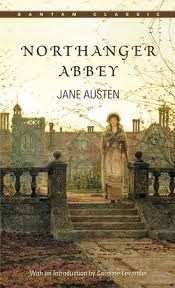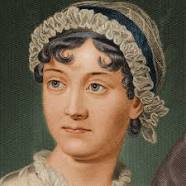Northanger Abbey Page #5
Northanger Abbey was the first of Jane Austen's novels to be completed for publication, in 1803. However, it was not published until after her death in 1817, along with another novel of hers, Persuasion.
Catherine coloured, and said, “I was not thinking of anything.” “That is artful and deep, to be sure; but I had rather be told at once that you will not tell me.” “Well then, I will not.” “Thank you; for now we shall soon be acquainted, as I am authorized to tease you on this subject whenever we meet, and nothing in the world advances intimacy so much.” They danced again; and, when the assembly closed, parted, on the lady's side at least, with a strong inclination for continuing the acquaintance. Whether she thought of him so much, while she drank her warm wine and water, and prepared herself for bed, as to dream of him when there, cannot be ascertained; but I hope it was no more than in a slight slumber, or a morning doze at most; for if it be true, as a celebrated writer has maintained, that no young lady can be justified in falling in love before the gentleman's love is declared,* it must be very improper that a young lady should dream of a gentleman before the gentleman is first known to have dreamt of her. How proper Mr. Tilney might be as a dreamer or a lover had not yet perhaps entered Mr. Allen's head, but that he was not objectionable as a common acquaintance for his young charge he was on inquiry satisfied; for he had early in the evening taken pains to know who her partner was, and had been assured of Mr. Tilney's being a clergyman, and of a very respectable family in Gloucestershire. CHAPTER 4 With more than usual eagerness did Catherine hasten to the pump-room the next day, secure within herself of seeing Mr. Tilney there before the morning were over, and ready to meet him with a smile; but no smile was demanded--Mr. Tilney did not appear. Every creature in Bath, except himself, was to be seen in the room at different periods of the fashionable hours; crowds of people were every moment passing in and out, up the steps and down; people whom nobody cared about, and nobody wanted to see; and he only was absent. “What a delightful place Bath is,” said Mrs. Allen as they sat down near the great clock, after parading the room till they were tired; “and how pleasant it would be if we had any acquaintance here.” This sentiment had been uttered so often in vain that Mrs. Allen had no particular reason to hope it would be followed with more advantage now; but we are told to “despair of nothing we would attain,” as “unwearied diligence our point would gain”; and the unwearied diligence with which she had every day wished for the same thing was at length to have its just reward, for hardly had she been seated ten minutes before a lady of about her own age, who was sitting by her, and had been looking at her attentively for several minutes, addressed her with great complaisance in these words: “I think, madam, I cannot be mistaken; it is a long time since I had the pleasure of seeing you, but is not your name Allen?” This question answered, as it readily was, the stranger pronounced hers to be Thorpe; and Mrs. Allen immediately recognized the features of a former schoolfellow and intimate, whom she had seen only once since their respective marriages, and that many years ago. Their joy on this meeting was very great, as well it might, since they had been contented to know nothing of each other for the last fifteen years. Compliments on good looks now passed; and, after observing how time had slipped away since they were last together, how little they had thought of meeting in Bath, and what a pleasure it was to see an old friend, they proceeded to make inquiries and give intelligence as to their families, sisters, and cousins, talking both together, far more ready to give than to receive information, and each hearing very little of what the other said. Mrs. Thorpe, however, had one great advantage as a talker, over Mrs. Allen, in a family of children; and when she expatiated on the talents of her sons, and the beauty of her daughters, when she related their different situations and views--that John was at Oxford, Edward at Merchant Taylors', and William at sea--and all of them more beloved and respected in their different station than any other three beings ever were, Mrs. Allen had no similar information to give, no similar triumphs to press on the unwilling and unbelieving ear of her friend, and was forced to sit and appear to listen to all these maternal effusions, consoling herself, however, with the discovery, which her keen eye soon made, that the lace on Mrs. Thorpe's pelisse was not half so handsome as that on her own. “Here come my dear girls,” cried Mrs. Thorpe, pointing at three smart-looking females who, arm in arm, were then moving towards her. “My dear Mrs. Allen, I long to introduce them; they will be so delighted to see you: the tallest is Isabella, my eldest; is not she a fine young woman? The others are very much admired too, but I believe Isabella is the handsomest.” The Miss Thorpes were introduced; and Miss Morland, who had been for a short time forgotten, was introduced likewise. The name seemed to strike them all; and, after speaking to her with great civility, the eldest young lady observed aloud to the rest, “How excessively like her brother Miss Morland is!” “The very picture of him indeed!” cried the mother--and “I should have known her anywhere for his sister!” was repeated by them all, two or three times over. For a moment Catherine was surprised; but Mrs. Thorpe and her daughters had scarcely begun the history of their acquaintance with Mr. James Morland, before she remembered that her eldest brother had lately formed an intimacy with a young man of his own college, of the name of Thorpe; and that he had spent the last week of the Christmas vacation with his family, near London. The whole being explained, many obliging things were said by the Miss Thorpes of their wish of being better acquainted with her; of being considered as already friends, through the friendship of their brothers, etc., which Catherine heard with pleasure, and answered with all the pretty expressions she could command; and, as the first proof of amity, she was soon invited to accept an arm of the eldest Miss Thorpe, and take a turn with her about the room. Catherine was delighted with this extension of her Bath acquaintance, and almost forgot Mr. Tilney while she talked to Miss Thorpe. Friendship is certainly the finest balm for the pangs of disappointed love. Their conversation turned upon those subjects, of which the free discussion has generally much to do in perfecting a sudden intimacy between two young ladies: such as dress, balls, flirtations, and quizzes. Miss Thorpe, however, being four years older than Miss Morland, and at least four years better informed, had a very decided advantage in discussing such points; she could compare the balls of Bath with those of Tunbridge, its fashions with the fashions of London; could rectify the opinions of her new friend in many articles of tasteful attire; could discover a flirtation between any gentleman and lady who only smiled on each other; and point out a quiz through the thickness of a crowd. These powers received due admiration from Catherine, to whom they were entirely new; and the respect which they naturally inspired might have been too great for familiarity, had not the easy gaiety of Miss Thorpe's manners, and her frequent expressions of delight on this acquaintance with her, softened down every feeling of awe, and left nothing but tender affection. Their increasing attachment was not to be satisfied with half a dozen turns in the pump-room, but required, when they all quitted it together, that Miss Thorpe should accompany Miss Morland to the very door of Mr. Allen's house; and that they should there part with a most affectionate and lengthened shake of hands, after learning, to their mutual relief, that they should see each other across the theatre at night, and say their prayers in the same chapel the next morning. Catherine then ran directly upstairs, and watched Miss Thorpe's progress down the street from the drawing-room window; admired the graceful spirit of her walk, the fashionable air of her figure and dress; and felt grateful, as well she might, for the chance which had procured her such a friend.
Translation
Translate and read this book in other languages:
Select another language:
- - Select -
- 简体中文 (Chinese - Simplified)
- 繁體中文 (Chinese - Traditional)
- Español (Spanish)
- Esperanto (Esperanto)
- 日本語 (Japanese)
- Português (Portuguese)
- Deutsch (German)
- العربية (Arabic)
- Français (French)
- Русский (Russian)
- ಕನ್ನಡ (Kannada)
- 한국어 (Korean)
- עברית (Hebrew)
- Gaeilge (Irish)
- Українська (Ukrainian)
- اردو (Urdu)
- Magyar (Hungarian)
- मानक हिन्दी (Hindi)
- Indonesia (Indonesian)
- Italiano (Italian)
- தமிழ் (Tamil)
- Türkçe (Turkish)
- తెలుగు (Telugu)
- ภาษาไทย (Thai)
- Tiếng Việt (Vietnamese)
- Čeština (Czech)
- Polski (Polish)
- Bahasa Indonesia (Indonesian)
- Românește (Romanian)
- Nederlands (Dutch)
- Ελληνικά (Greek)
- Latinum (Latin)
- Svenska (Swedish)
- Dansk (Danish)
- Suomi (Finnish)
- فارسی (Persian)
- ייִדיש (Yiddish)
- հայերեն (Armenian)
- Norsk (Norwegian)
- English (English)
Citation
Use the citation below to add this book to your bibliography:
Style:MLAChicagoAPA
"Northanger Abbey Books." Literature.com. STANDS4 LLC, 2025. Web. 23 Feb. 2025. <https://www.literature.com/book/northanger_abbey_45>.








Discuss this Northanger Abbey book with the community:
Report Comment
We're doing our best to make sure our content is useful, accurate and safe.
If by any chance you spot an inappropriate comment while navigating through our website please use this form to let us know, and we'll take care of it shortly.
Attachment
You need to be logged in to favorite.
Log In